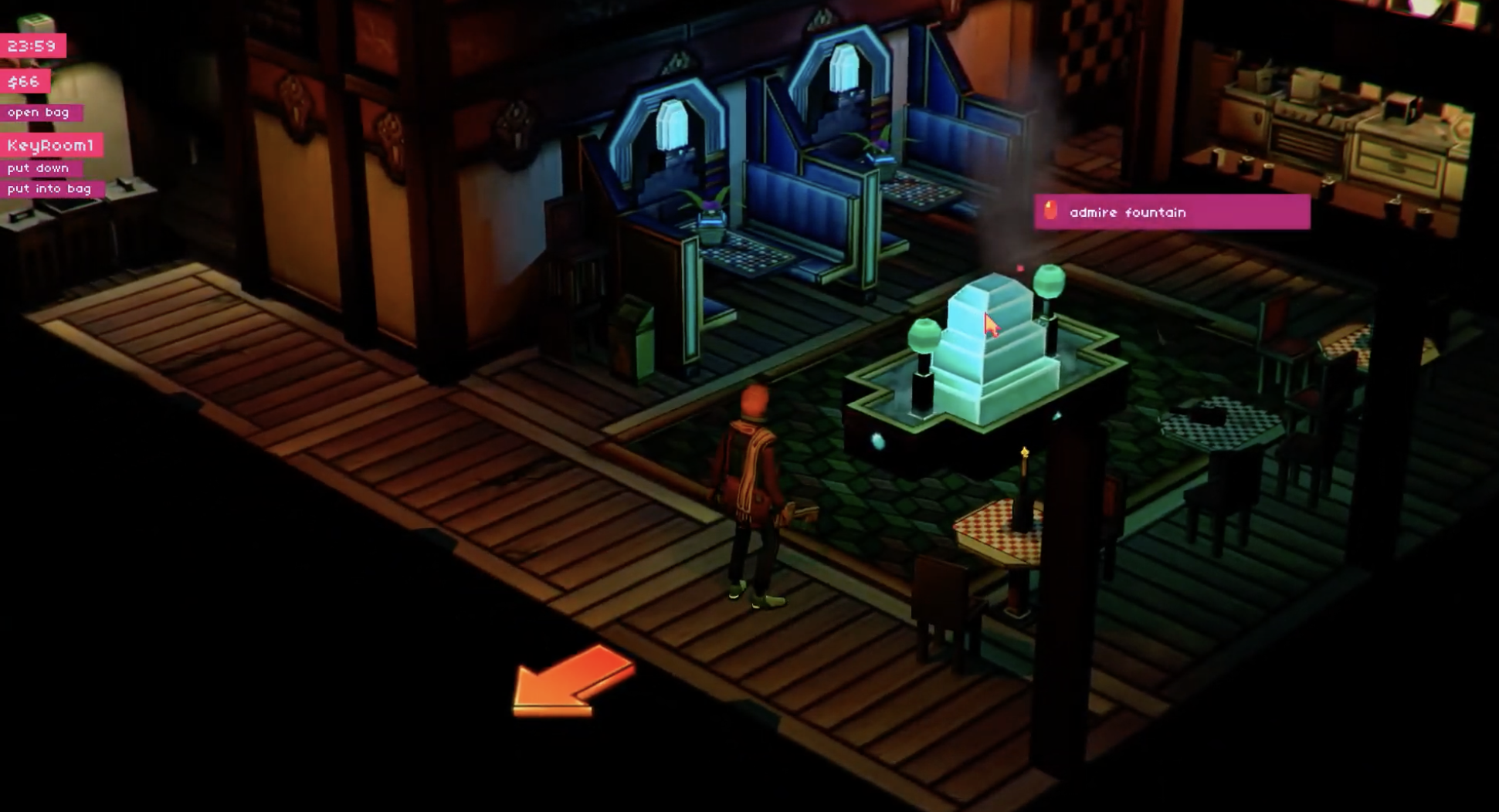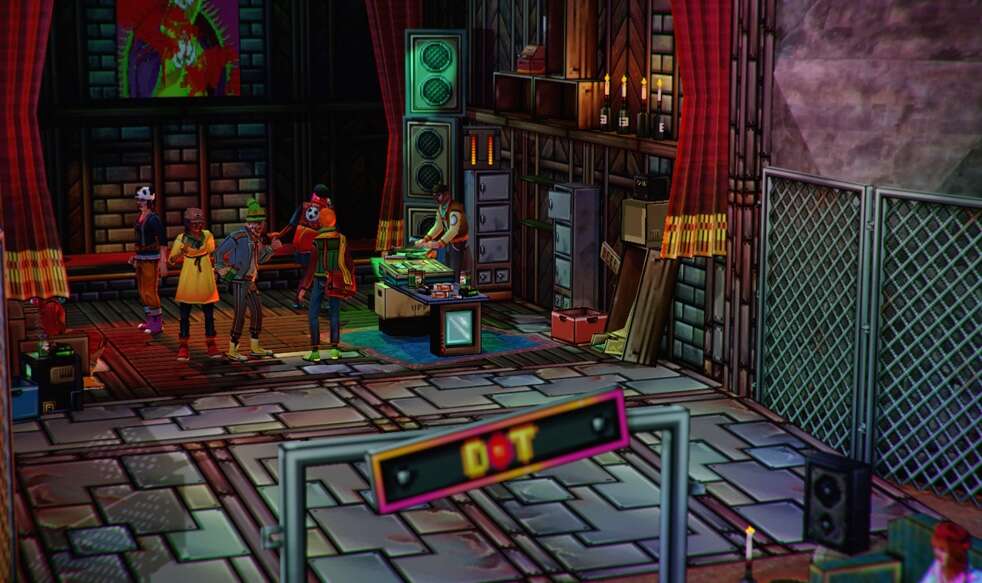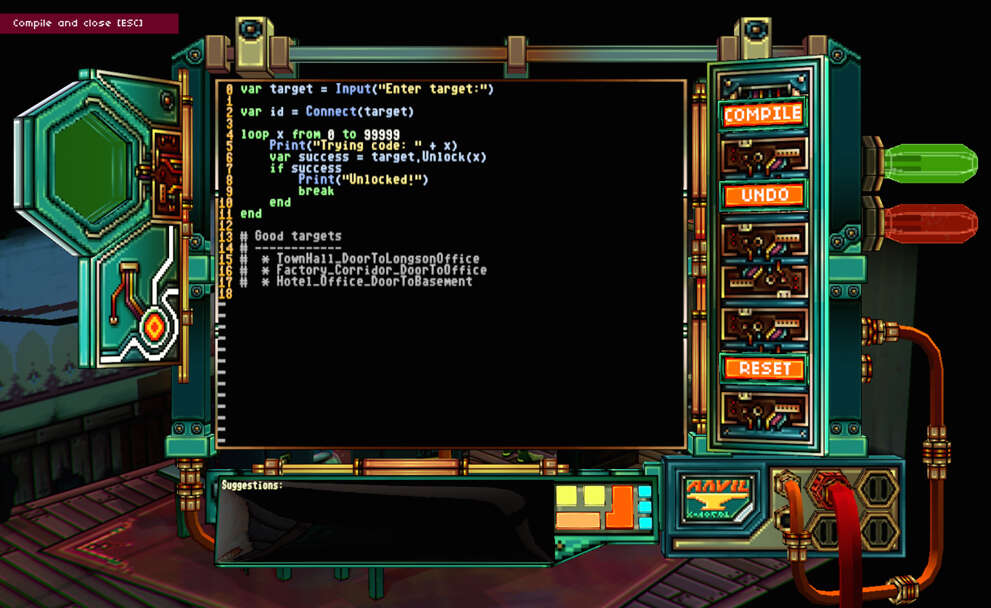
She lives in your hotel, but she only leaves her room at night. Her life consists of her bedroom and the hotel kitchen—nothing outside, nothing in between. She doesn't want to talk to you. She doesn't want to talk to anyone.
else Heart.Break(), released by Erik Svedang in 2015, is a uniquely lonely game. Most characters in it say very little to you. When you've exhausted their dialogue, they fall completely silent: clicking on them to talk with them is about as productive as clicking on a rock. Almost all conversations consist of small talk. This is a game where one of the closest things to connection you can find is a young man who will talk to you while he's on drugs, to offer you drugs, and to talk about the drugs he's taken. (He's a sweet kid, really.)
The irony is that, in else Heart.Break(), you are virtually a god. Every object in the game is reprogrammable: you can rewrite a cup of coffee to unlock doors nearby you when you sip it, or redesign a turtle to turn it into a bloodhound. Its world is astoundingly dense, and full of layered secrets—most of which you'll never come across by following the game's overarching story.
The one thing you can't change is people.

Let's talk about that story briefly: once, and then never again. In else Heart.Break(), you are Sebastian, an awkward twentysomething who still lives with his not-exactly-loving parents. You get a job in distant Dorisburg, selling a type of soda that nobody in town really wants. (And the douchebag who hired you isn't really all that keen to make your acquaintance.) While you're there, though, you stumble upon something wondrous: for some reason, this town seems to be half-digital. People can literally see the code that makes it operate, and tweak it to their liking.
Predictably, this leads you to a confrontation with an evil dystopian corporation. Even more predictably, you get into all of this because you meet a girl at a nightclub.
The girl: Pixie. Her shitty neglectful boyfriend: Ivan. It's all so cut-and-dry.
Only it isn't. You can save the day, but you can't get the girl. In fact, saving the day means her kicking you out of town—for your own good, of course. Ivan remains. Hell, the one time you "crack the case" and track Pixie down to her secret cyberpunk renegade underground hideout, she accuses you of stalking her. Which is fair, because... well... you stalked her.
Nobody cares that you're here. They are lonely, but they're not waiting for you. You are an outsider, literally and figuratively. Trying and failing to sell shitty sodas is the most empowering option you've got. Well, that and rewriting the fundamental rules of this universe, until its every door opens for you and you alone. (Again, literally and figuratively.)
Dorisburg is littered with floppy disks. People keep their notes on them—and their diaries, too. Their inner worlds, their favorite poems, notes on revolutions, the things that trouble them, the struggles that define their relationships with other people... all of it can be found, these blogs that are scattered across this cluttered physical world, clues to the mysteries that these people will never solve for you. Questions that kick off new mysteries—not all of which will ever be resolved.
You can read them. It doesn't matter. The Legend of Zelda: Majora's Mask iconically offered you an item called the Bomber's Notebook, which tracked every townsperson in its world, giving you a way to help each one with their respective sorrows. The world could be healed, person by person, even if your constant time-travel meant the healing was inevitably undone. else Heart.Break() has no Bomber's Notebook; you can learn things about people that they've never tell you to your face, and your reward is... nothing. You are still an outsider to them.
Plenty of people in this world program it too: they sit by their computers day and night, working on projects you can't fathom. Some of them seem to be pursuing other coders, ones who've vanished, ones you'll only ever know by name. A few of them are dwelling on the ominous fact that parts of this world seem to be dissolving, replaced by pulsating neon abstractions that might be spreading. None of this is part of the story. It hangs in the air, unspoken and unaddressed. Whatever these people discover, whatever adventures they'll get into once you leave, are not yours to experience. All you'll ever get to know of them is their silence as they type and type and type away, exploring worlds unseen and unknown.

You too might find yourself lost in abstraction. The power you hold over this world is amazing: there is potential, not just to be powerful, but to be creative. The entire town is a circuitboard, waiting for you to program it. You could reprogram a single door in every map to return you to a centralized hub, letting you travel anywhere from anywhere. (I once turned a cruise ship into my secret base: the door to every passenger's room led me to a different critical location.) You could rewire a security computer to target streetlights nearby you, flashing as you walk by them—or speaking the locations of other characters out loud, rewriting the entire town to serve as a personalized panopticon.
There are no "rewards" for doing this, apart from seeing just how much you can get away with. (My younger sister was briefly the world record holder for else Heart.Break() speedruns, utilizing a script she wrote that, among other things, literally placed a crucial character in Sebastian's pocket.) Given enough coffee—or given a programmable sink that can rewrite your coffee for you—you can do away with your need for sleep, which means doing away with your hotel room altogether. You can stay up for days straight, working on projects of yours in real-time. When you see the outside world, it might be dawn or afternoon or midnight. Life is slipping you by, but that's okay: there was nothing out there for you anyway. Your parents won't notice if you go missing. Nobody will notice. You walk into the other coders' rooms and it doesn't matter that they won't speak to you, because you've stopped trying to speak to them anyway. Pixie can't break your heart if you never talk to her at all.
Which brings me back to Siri, the lonely woman trapped in your hotel.
Siri doesn't touch computers. She paces her bedroom during the day, or lies in bed with her eyes open. She'll sneak into the hotel kitchen late at night, but this minor, harmless transgression is the closest she gets to taking action of any kind. Unlike most characters, you can talk with her more than once; she'll talk with you once a night, unless you seem threatening or judgmental in any way, in which case she'll back off.
These conversations are stiff at first, but slowly they blossom, until they're as close to "real" dialogue as this game gives you. She eventually asks you what your favorite kind of music is—believe me when I say that, by else Heart.Break() standards, this is absolutely meteoric. Two days later, she asks whether she can talk to you about something. You agree, and she pauses, and then... she changes her mind. This is the last conversation you and she will ever have.

It is possible to parse through the game's own files—how meta!—and find one final conversation you could have had with Siri. I've never been able to work out how to trigger it; it seems to happen if you're on the verge of leaving Dorisburg, and stop by to see her and say goodbye. You might have asked her to come with you; she would have refused, of course. But there's one line in the files, seemingly disconnected from all the others, that hints at something never seen, never discussed, never implemented.
"You'll never have to be afraid of him again," you would have said.
She'd still say no. And then you'd leave, with just another heartbreak added to the pile.
As things stand, it's hard to even know where exactly this line fits in. Was Siri originally intended to tell you something extra? Does him refer to a man you've met in this town, a man you've walked past and tried to talk to, or would it have been somebody far away, never seen and never named? Is this the reason why Siri hides out in her room during the daytime? Is this why she sits alone every night?
There are no answers: not in the game, not tucked away on floppy disks, not even in else Heart.Break()'s cryptic program files. All you're left with is the closest thing to a "gamelike" moment you can share with someone in this world: the one thing you have to work towards, night after night, in order to achieve. A moment where someone almost opens up and tells you something, almost gives you what might have been an answer or a reason or an explanation, enough to ask you whether or not you'd let her say it to you... and finds out that she can't.
In this world, you can do anything but anything. You can put another person in your pocket, but they'll never tell you who they are.
You are the protagonist. You are at the center of the world. You are God.
And like God, you are alone.